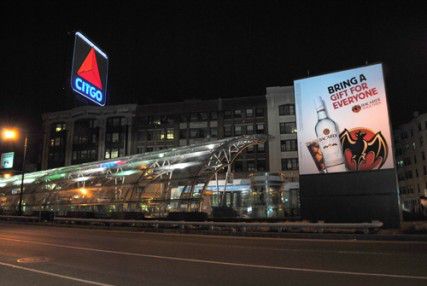 Although the Massachusetts Bay Transportation Authority is about $5.2 billion in debt, it will bar alcohol-related ads starting this summer, MBTA officials said.
Although the Massachusetts Bay Transportation Authority is about $5.2 billion in debt, it will bar alcohol-related ads starting this summer, MBTA officials said.
The MBTA announced Tuesday they will be removing all alcohol-related ads beginning July 1, said MBTA spokesman Joe Pesaturo.
Alcohol-related ads currently appear on all buses, trains, stations and platforms, and the MBTA has been asked to ban them for many years, Pesaturo said. Removing these ads, however, will result in a net loss of $1.5 million the first year.
The T’s operating deficit is $161 million in 2012 and fares are set to increase, but Pesaturo said there are other ways to find advertisements and income. While one might expect fare increases to somehow subsidize their loss, he said this was not how the MBTA balanced its budget.
“The T’s advertising contractor, Titan, says it expects ad revenue to decline by approximately $1.5 million in the first full year,” Pesaturo said. “The company, however, says it will work diligently to find other advertisers for the available space on MBTA property.”
The move is a result of continued pressure on the MBTA from SAFE MA, or Supporting an Alcohol Ad-Free Environment in Massachusetts, and the youth coalition from the Allston-Brighton Substance Abuse Task Force.
“The youth coalition made a presentation to the Board of Directors, Secretary Richard Davey and Acting General Manager Jonathan Davis at the Board’s monthly meeting in early December,” Pesaturo said. “In subsequent discussions, Secretary Davey and GM Davis talked about the issue and agreed with the points raised by the group.”
Pesaturo said last week Davey told Stacy Carruth, a member of the Regional Center for Healthy Communities, the MBTA decided to ban all alcohol-related ads on their property.
Elizabeth Parsons, the community coordinator for the ABSATF, said in an email that the active youth coalition has been putting pressure on the MBTA since the summer.
“In December, the youth coalition presented to the MA Dept. of Transportation Board about the effects of alcohol ads on Boston youth,” Parsons said. “At the presentation, youth shared facts from the BU School of Public Health data about youth exposure to alcohol advertising on the MBTA.”
The coalition has been actively educating local- and state-level leaders about the effects of alcohol advertising on Boston youth, she said.
Parsons said the group was first able to voice their concerns regarding the MBTA’s alcohol ads when they met with Davey at his summer meet-and-greet session in Ashmont.
Studies show that underage teens drink more excessively if they see more alcohol ads around them, Parsons said. In addition to their presentation, the youth took photos of every alcohol advertisement they saw on every T line.
“We are not opposed to the T advertising, just to alcohol advertisements,” Parsons said. “The T contracts with agencies to identify advertisers. These agencies, not the T, will need to work to find replacement advertisers.”
Carolina Navarrete, a Boston University College of Communication freshman, said she rides the T about six times a week.
Although Navarrete said she has never noticed the amount of alcohol-related ads, she believes “they would not influence me because I am so used to seeing them in so many places that I tend to block them out.
“I feel that this was a bad move because the MBTA is taking away freedom of speech to be able to place ads on a certain subject.”
Alexa Galloway, a COM freshman who said she rides the T about four times a week, said although she notices the ads, they do not stand out as dominant amongst the other ones on the T.
“I think it’s interesting that they are taking such a direct stand to it,” Galloway said. “I feel like . . . people are going to drink whether or not an ad tells them to.”
But following the MBTA’s announcement, the youth coalition is “elated,” Parsons said.
“They are proud of themselves for speaking up about what they believe in,” Parsons said, “and they’re proud of their city—that their city takes their concerns and the health of Boston youth seriously.”



















































































































